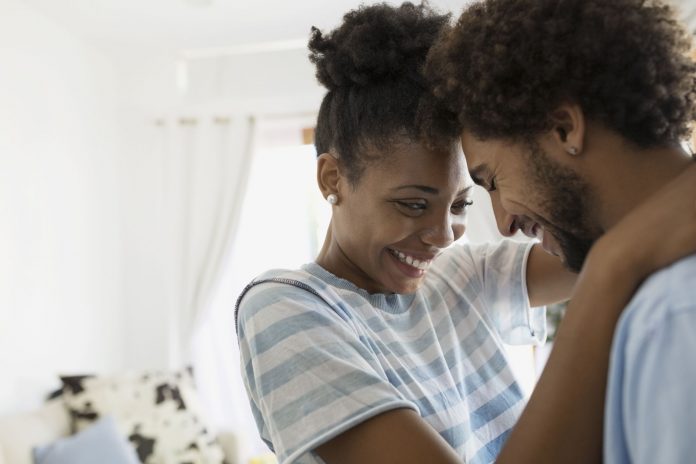You can get through this difficult time together.
Are you or your partner struggling with depression? Mental health can adversely affect every aspect of our lives – including our relationships – and when one partner is depressed, the relationship may suffer.
This can be problematic, because a good relationship can be therapeutic for somebody with depression. When we’re low we need love, support and closeness more than ever – even if we’re not good at showing it. But there are a few things you can do to help yourself and your partner get through this difficult time.
Therapist, broadcaster and health writer Christine Webber explains how depression affects sex and relationships and how to navigate this tricky time together:
Is your partner depressed?
Depressed people are usually quite withdrawn. They don’t feel they can raise enough energy to pursue their normal routine, do things with the family or even notice when their partners are being attentive. This can quickly lead to the non-depressed partner feeling that he or she is in the way, unwanted, or unloved. It can be easy to misinterpret the low moods as hostility, or as evidence that the depressed person has lost interest in the relationship.
Frankly, it’s really hard to stay calm and confident when the person you love most is acting strangely and appears to be so unhappy. So if you’re finding your partner’s depression a real pain, try to take heart from the fact that this is natural, though difficult.
It’s hard to stay calm and confident when the person you love most is so unhappy.
Even if you’re at your wits’ end because your loved one has lost the ability to concentrate on what you’re saying, or to raise a smile, or to appreciate any of the good moments in life, do try to accept that these things are part of the illness.
Sex and depression
We don’t know enough about the chemical changes that occur in the brain during depression and little research has been done on how these changes affect sex. From a clinical point of view, however, it’s clear that a depressive illness tends to affect all the bodily systems, dislocating them and often slowing them down.
This effect is most marked with regard to sleep, which is invariably disrupted. But there can be adverse effects on any activity that requires energy, spontaneity and good co-ordination – and that includes sex. And, sadly, lots of individuals who are depressed often appear to lose interest in sex.
Depressive illness tends to affect all the bodily systems, dislocating them and slowing them down.
Admittedly, this isn’t always the case, and some depressed people manage to maintain normal sex lives – sometimes even finding that making love is the only thing that gives them comfort and reassurance.
• Depression for men
For men, the general damping down of brain activity causes feelings of tiredness and hopelessness, which may be associated with loss of libido and erection problems.
• Depression for women
For women this diminished brain activity tends to be associated with lack of interest in sex and very often with difficulty in reaching orgasm.
All these problems tend to disappear when the person gets better. Indeed, renewed interest in sex may be the first sign of recovery.
Sex and antidepressants
It’s not just the illness that affects a person’s sex-life – antidepressant medicines such as Prozac can affect sexual function. One of the most common side-effects is interference with the process of orgasm so that it’s delayed or doesn’t occur at all.
If this happens – and you are keen to have and enjoy sex – ask your doctor about changing medication.
How can depressed people help themselves?
Some days will seem better than others. If you are suffering from depression, on your better days, try to make an effort to show love and appreciation to your partner. The following tips might also help:
• Exercise
Try to go for a walk every day, preferably with your partner. Walking not only gets you out in the fresh air, but, like other forms of exercise, it releases endorphins in the brain. These are ‘happy’ chemicals that rapidly elevate your mood. And there’s considerable evidence to suggest that exercise can be as good for combating depression as any antidepressant.
• Be mindful of the good moments
Even during your saddest periods, try to spot happy moments like a bird singing or a new flower blooming in your garden. Try to train yourself to notice three of these heart-warming moments per day.
• Eat five-a-day
You may have an odd relationship with food while you’re depressed (you could have little appetite or constantly comfort eat), but try to eat five pieces of fruit per day. This is a caring thing to do for yourself and is good for your physical and mental health.
• Turn up your favourite songs
Listening to music that matters to you will boost your mood.
• Have faith
Remember that depression will pass and that you will enjoy your life again.
• Make time to cuddle
Even if you don’t feel like full-on sex, do make the effort to have a cuddle. If you are worried that cuddling will project you into full sex when you don’t want it, just tell your partner that you’re not feeling like having sex, but that you would really like to cuddle up. If you do this, you may both feel a lot better. Touch and closeness can keep a relationship intact.
How to help your depressed partner
If your partner is the one who is suffering, try to remember the following:
• Be patient
Don’t keep saying that you understand what your partner is going through. You don’t. Instead say: ‘I can’t know exactly how you’re feeling, but I am trying very hard to understand and help.’
• Try not to take it personally
Try to remember that any loss of interest in sex is probably not personal, but connected with the illness. The fact is that many depressed people lose their libido.
• Don’t despair
Some days you’ll feel your love for your partner doesn’t seem to make any difference to them at all. But hang on in there. Your love and constant support should be of great help in persuading your partner of his or her value.
• Seek professional help
Encourage your partner to get all the professional help available. Antidepressants can have life changing effects and Cognitive behaviour therapy (CBT) is becoming much more readily available on the NHS. Many GP practices can also provide CBT by means of Internet programmes. These can have a good effect quite quickly.
• Take time for TLC
Try to act as though your partner were recovering from a serious physical illness or from surgery. Give plenty of tender loving care. But don’t expect improvement to be rapid.
• Look after yourself
Do something nice for yourself. Being around a depressed person is very draining, so make sure you look after yourself. Have some time alone, or get out to a film or to see friends. Depressed people often want to stay home and do nothing, but if you do this too, you’ll get terribly fed up.
• Remember this will pass
Remember that your partner’s illness will pass and that he or she is the same person underneath the depression as before.
• Get plenty of exercise
Try to take some exercise together. Most depressed people feel an improvement in their spirits if they do something active. And doing something that will raise the heartbeat – for example, sport or dancing – may well help you too.





























